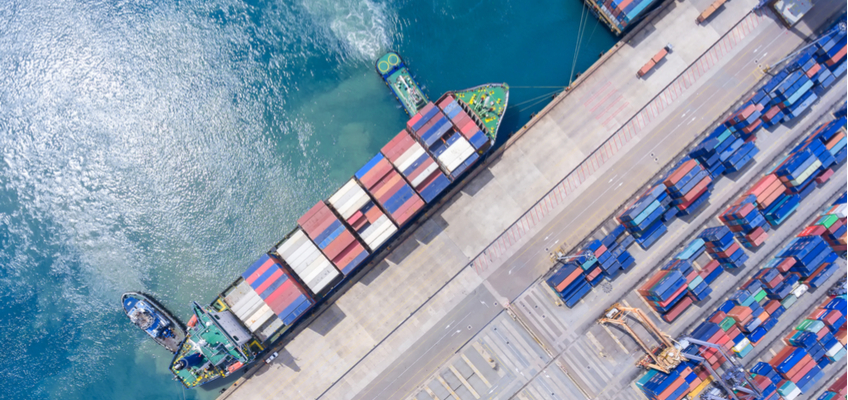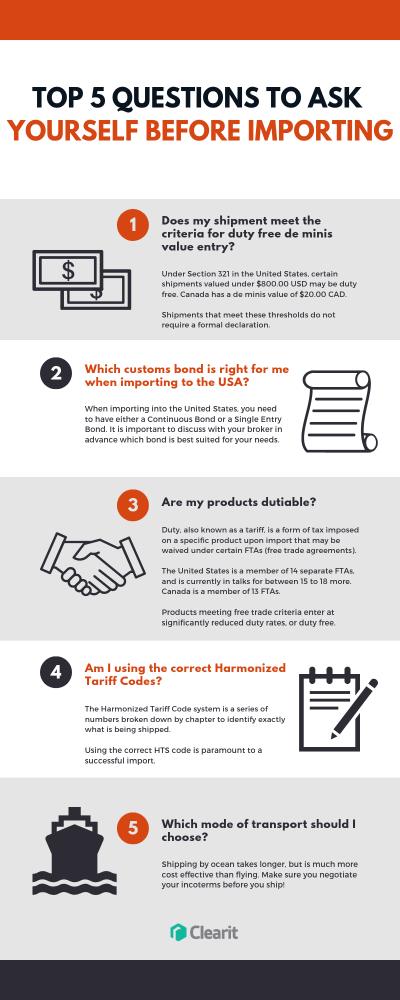
Top 5 Questions To Ask Yourself Before Importing
Editor’s note: This is a guest post from Adam Lewis, President and founder of Clearit.
International shipping and importing may seem like daunting tasks, but armed with key knowledge, you’ll have the confidence and know-how to see it through.
Below are our top 5 questions to ask yourself before importing commercial products into the USA and Canada to ensure you’re ready.


1. Does my shipment meet the criteria for duty free de minis value entry?
In the USA, Section 321 allows for commercial goods to enter duty free and without a formal declaration by setting the maximum de minis value. To qualify, the shipment must be destined to a single consignee and not be one of several lots covered by a single order. The value of the shipment cannot exceed $800.00 USD and may enter the United states by land, sea, or air. Be aware CBP (Customs and Border Protection) has the right to refuse the release a shipment under section 321 when taking risk considerations and merchandise into account.
Shipments to Canada can be duty free if they fall under the Canadian de minis value. Currently, the de minis value for a duty free shipment to Canada is a measly $20.00 CAD, but that may be about to change as part of a concession for a new pan-continental trade deal. With Mexico recently agreeing to raise their threshold from $50.00 to $100.00, many insiders are expecting a $200.00 de minis at the very least with a new trade deal.
2. Which customs bond is right for me when importing to the USA?
In order to import into the United States, a customs bond is required. Customs surety bonds are contracts that guarantee specific obligations will be fulfilled, so both customs and the importer are held accountable for their responsibilities in the import transaction.
Two kinds of bonds exist — the Continuous Bond or the Single Entry Bond. If you’re looking to import frequently, Continuous Bonds are ideal; they cover all bond requirements, including ISF filing, for one year. By contrast, Single Entry Bonds are ideal for low-value, infrequent importing, and does not cover ISF filing.
Costs for a bond may vary depending on your Customs Broker or surety company. However, the average cost of a Continuous Bond is approximately $500.00 – $550.00 USD per year. The average cost of a Single Entry Bond should be approximately $5.00 per $1,000.00 of invoice value. A minimum amount of $50.00 normally applies to Single Entry Bonds, as well as a small preparation fee.
You may always move your first shipment on a Single Entry Bond and move to a Continuous Bond later on, but not vice versa.
3. Are my products dutiable?
Duty, also known as a tariff, is a form of tax imposed on a specific product upon import. Duty is imposed for many reasons including to protect domestic production, protect jobs, control the flow of goods, and more. One way to avoid these duties is through an FTA (free trade agreement). The United States is a member of 14 separate FTAs, while Canada is close behind with 13 FTAs. Products meeting free-trade criteria enter at a significantly reduced rate or duty-free with a signed certificate.
As of this moment, the United States is a member of 14 separate FTAs (Free Trade Agreements) and is currently said to be in talks for between 15 to 18 more. Canada follows closely behind with 13.
Free Trade Agreements greatly reduce, or eliminate altogether, duty that would otherwise be applied to a product upon import. Before shipping to the USA or Canada, it is important to research whether your product was manufactured in a country which has an FTA in place with either country.
Remember, to meet the qualifications for the FTA, a signed certificate must accompany the shipping documents at the time of clearance.
American Free Trade Agreements: Israel, Canada, Mexico, Jordan, Australia, Chile, Singapore, Bahrain, Morocco, Oman, Peru, Dominican Republic, Panama, Colombia, and Korea.
Canadian Free Trade Agreements: USA, Mexico, Israel, Chile, Costa Rica, Peru, Columbia, Jordan, Panama, Honduras, South Korea, Ukraine, and the E.U.
4. Am I using the correct Harmonized Tariff Codes?
You may be tempted to overlook the 10-digit code next to the product description on your American or Canadian commercial invoice, but it is vitally important!
While seemingly random, the Harmonized Tariff Code system is a series of numbers broken down by chapter used to identify exactly what is being shipped, right down to the fabric content and intended gender of the user. By accidentally assigning the wrong HTS code, your duty-free item could now be dutiable at 18%, even with the correct item description. A misdeclaration of goods could even lead to stiff penalties and a red flag for future imports.
While the Harmonized tariff code system is international, only the first 6 digits are recognized by each country. The last 4 digits may vary, so a Canadian HTS code may not necessarily be the same headed towards the United States.
Always be sure to check with your Customs Broker to ensure you are using the proper classification!
5. Which mode of transport should I choose?
When shipping overseas, the choice between ocean or air transport should be relatively easy.
Do you need your product now, or later? Ocean transport is a fraction of the cost of flying, so when planned in advance, ocean is always the way to go, even with the increased transport time — and be sure to negotiate your incoterms ahead of time.
FOB, or Free on Board, is the most cost-effective incoterm. The buyer assumes ownership and responsibility of the goods once leaving the point of origin and shipper has covered the cost of freight. Once the shipment is placed on the vessel, the buyer takes all responsibility for any further charges. FOB can only be used for ocean transport, not air.
Other incoterms include CIF (Cost, Insurance, and Freight) where the seller pays to bring the goods to the destination port and procures marine insurance but does not hold risk of loss or damage, and more.






